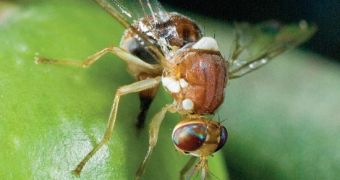Scientists working with British company Oxitec are convinced that, all things considered, genetically modified insects could successfully replace chemical pesticides.
The researchers argue that, when compared to chemical pesticides, such insects would cause significantly less damage to the environment. What's more, they would not constitute a threat to public health.
Sources say that these scientists have recently finished work on engineering several genetically modified male olive flies.
These insects, dubbed Frankenflies, will soon be released into certain agricultural regions in Europe.
The Frankenflies are expected to mate with wild female olive flies.
Whatever female offspring the latter would produce after mating with the genetically modified males are supposed to die either at the larvae or at the maggot stage.
On the long run, this would translate into a whopping drop in the olive fly population. This means that crops would be kept safe from these pests without farmers' having to resort to various chemical pesticides.
“Our approach is aimed not only at controlling the olive fly, but also to avoid harming other species. By using our form of genetic sterility our flies are designed to eliminate the pest and not to stay in the environment,” Dr. Martha Koukidou explained.
By the looks of it, the genetically modified olive flies will first be trialed in Spain.
“We have been looking for a highly effective and environmentally sound solution for olive fly. We believe this holds great potential,” said Victor Perdrix, spokesperson for Spanish company OpenNatur.
Should things go as planned, they will also be used to safeguard crops in Italy and Greece.
Later on, the scientists plan to turn their attention towards crops in Britain. Thus, they wish to develop genetically modified diamond back moths and use them to keep cabbage and broccoli crops free from pests.
Commenting on these projects, Oxitec Chief Executive Hadyn Parry stated as follows:
“European agriculture is facing some severe challenges. The burden of agricultural pests is ever present while the number of control approaches is shrinking in the face of insecticide resistance and de-registration of existing chemical treatments.”
Furthermore, “To survive and prosper, European farming will need to evaluate and embrace new solutions and new technologies which are effective, sustainable and safe.”

 14 DAY TRIAL //
14 DAY TRIAL //